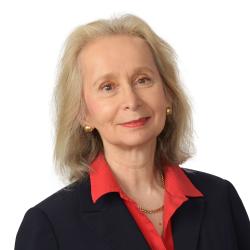Anna Nagurney: OIM, Isenberg Make an Impact
October 30, 2024
By Anna Nagurney
I am writing this article on the train from Gothenburg, Sweden, to Copenhagen, Denmark, where the EURO Conference will take place. This is my third week in Europe, doing “trip chaining” between conferences and meetings with collaborators in different countries. As an operations management professor—whose teaching and research focus on transportation and logistics plus supply chains from agricultural to humanitarian ones—being an eyewitness to practice, which includes travel, is critical.

This past spring semester was truly special, and I can’t say enough wonderful things about our students. In teaching my Humanitarian Logistics and Healthcare class at 8:30 a.m., I had several students arrive in the classroom before 8 a.m., with one driving 90 minutes from Pittsfield. This kind of dedication and work ethic inspire me. Being a faculty member in OIM is a joy. Our students are intellectually curious, kind and respectful, and so eager to learn. Plus, they are engaged in meaningful extracurricular activities such as the OIM Club, the Consulting Club, and the UMass Amherst INFORMS Student Chapter, as only three examples. Many graduate with valuable internship experiences and have held responsible jobs on campus, with some even having spent a semester abroad.
My Humanitarian Logistics and Healthcare class is one in which we discuss all phases of disaster management and learn how humanitarian logistics differs from commercial logistics. At the same time, we learn how best practices from each can enhance emergency management and business continuity. We work on supply chain network optimization under uncertainty and discuss blood supply chains as well as pharmaceutical ones. Powerful analytical tools for evacuation management in the case of disasters—as well as the identification of which supply chain nodes and links are the most important for network performance and, hence, also for investment—are deeply studied.
An essential component of this class is having guest speakers, who are expert practitioners. They share their knowledge and experiences, which can include responses to hurricanes and tornadoes, pandemic response, keeping UMass Amherst safe, and even protection of the Boston Marathon route! It was an honor to have as guest speakers this past semester:
- Dawn Brantley, director of the Massachusetts Emergency Management Agency (MEMA), who shared her wealth of practical experience (which also includes inclusiveness of those with disabilities);
- Jeff Hescock, executive director of Environmental Health & Safety and Emergency Management at UMass Amherst, who shared his career experiences and also how UMass responded to the meningitis outbreak and COVID-19 pandemic;
- State Sen. Jo Comerford, who shared with us important legislative initiatives; and
- Michele Kearsley, director of medical imaging at Massachusetts General Brigham-Cooley Dickinson Hospital, who spoke on crisis management and evolving leadership.
In previous semesters, we’ve hosted:
- The director of logistics of the American Red Cross;
- a team of eight nurses from Cooley Dickinson Hospital, who spoke on how they responded to COVID-19;
- the Director of security of Baystate Medical Center;
- National Guardsmen, who have responded to multiple disasters;
- the head of Civil Protection in Greece, who spoke about battling wildfires; and
- a United Nations representative to Armenia.
The guest speakers enjoy interacting with students and provide further networking opportunities for them. Such educational experiences for our students are transformative and suggest possible career paths.
In addition, this past semester, we took part in a field trip—thanks to Amherst Town Fire Chief Tim Nelson and Captain Steven Chandler. The field trip was to the Amherst downtown fire station, where students saw in real-time how our firefighters—who are also trained as EMTS—responded to three emergencies. Climbing on the ambulances and fire trucks and learning about the challenges was instructive and informative.
Honestly, I did not want the semester to end but was thrilled to see so many of the students in my class graduate and begin an exciting new phase of their lives as Isenberg alumni. I know they will continue to make positive impacts.
And, soon, in Copenhagen, I will see several of my former Isenberg PhD students, who are now successful professors at different universities, contributing to their students education in operations management and supply chain management.
At this conference, besides speaking on an invited panel about “networking,” I will also present a paper on supply chain management and agricultural international trade under disruptions. The paper was co-authored with Dana Hassani, one of my PhD students, and two colleagues at the Kyiv School of Economics (KSE) in Ukraine. This collaboration was made possible through the outstanding support of Isenberg School Dean Anne P. Massey, International Programs Director Kalpen Trivedi, and the UMass Amherst Provost’s Office. UMass Amherst, beginning in March 2022, signed a series of memoranda of understanding with KSE, which has resulted in 15 Virtual Scholars in Ukraine working with UMass Amherst faculty in the first cohort, plus 10 additional ones in the second cohort. All of these have been matched with Isenberg School faculty. Also, this past academic year, we had four exchange students from KSE, and they loved their Isenberg classes. Next fall, we will have five from KSE.
As of March 2022, I am serving as co-chair of the Board of Directors of KSE but have served on its International Academic Board and its board of directors for over half a decade. Working with a Nobel Prize winner in economics, former United States ambassadors to Ukraine, top financiers and consultants, KSE President Tymofiy Mylovanov, KSE Rector Tymofii Brik—and even Ukraine’s major rockstar—has been an incredible experience. Helping to lead a university in wartime is not easy, but one does what one can to help in the preservation of higher education.
I am honored and proud of the impact that OIM and Isenberg is making through the activities of our students, faculty, and staff. OIM and Isenberg are leading the way in education, research, and outreach.